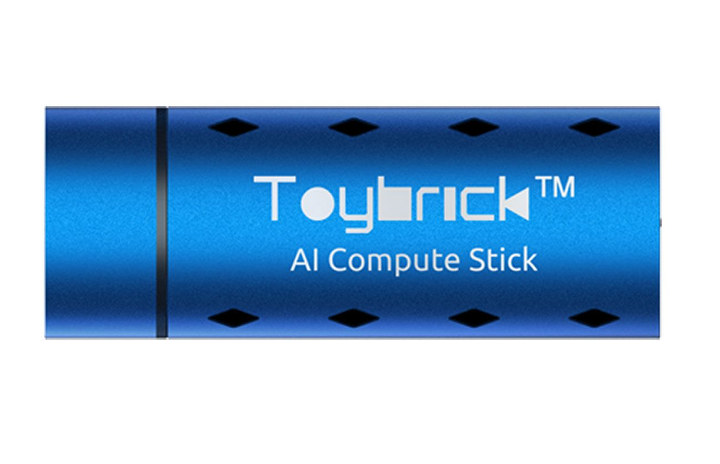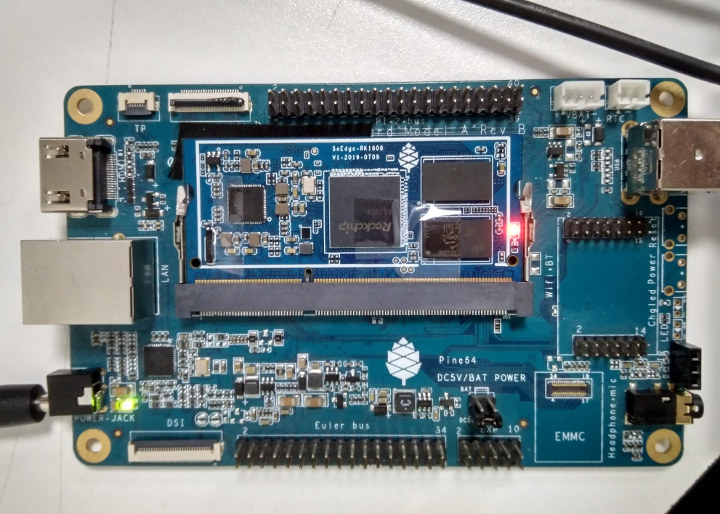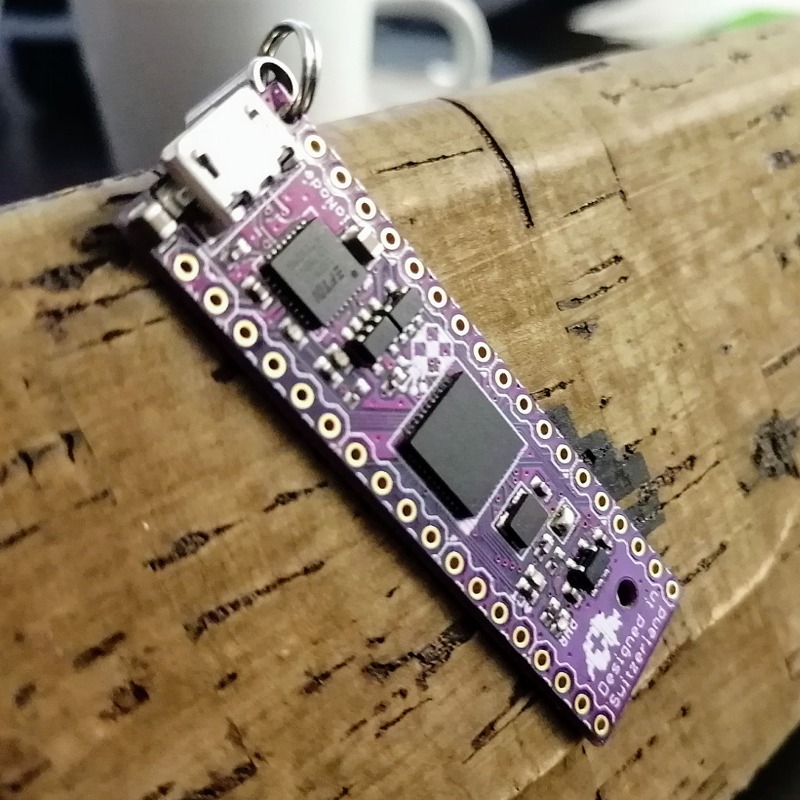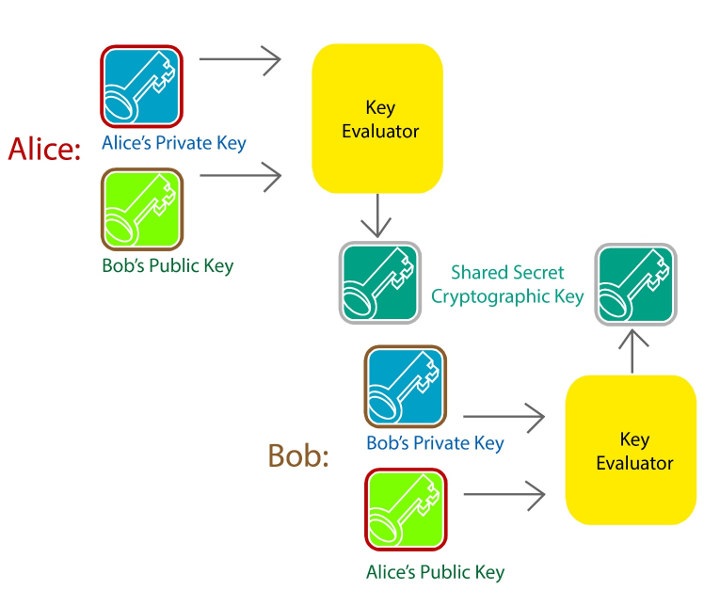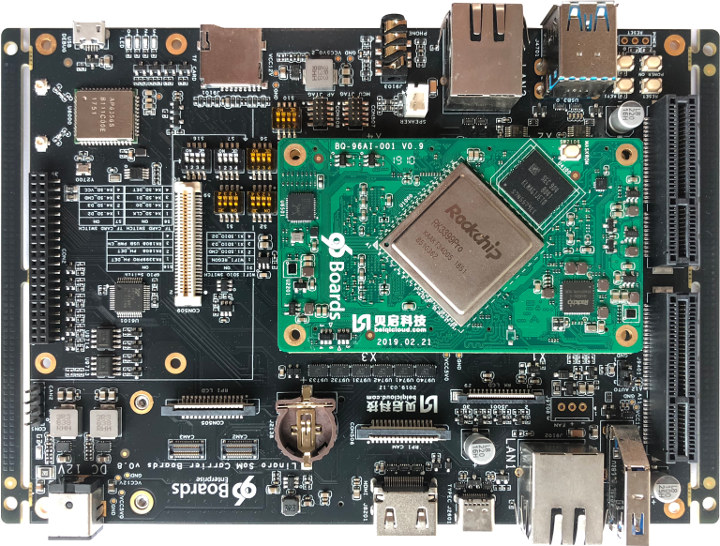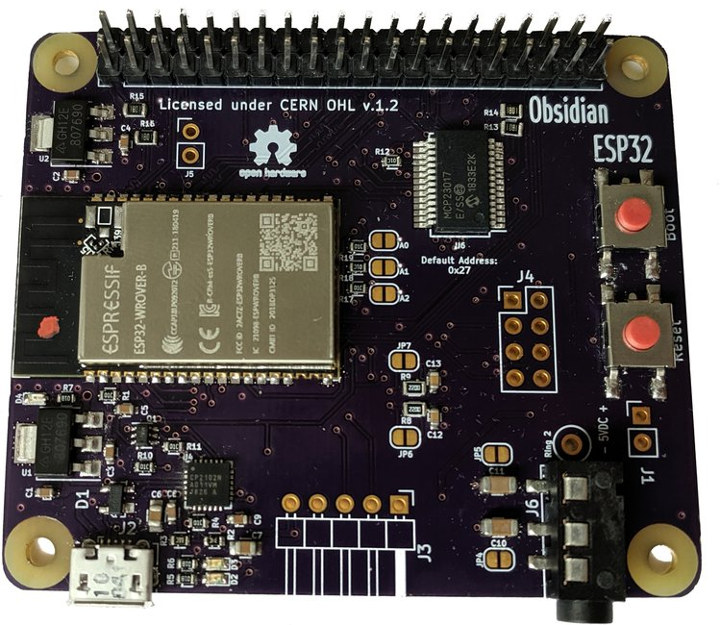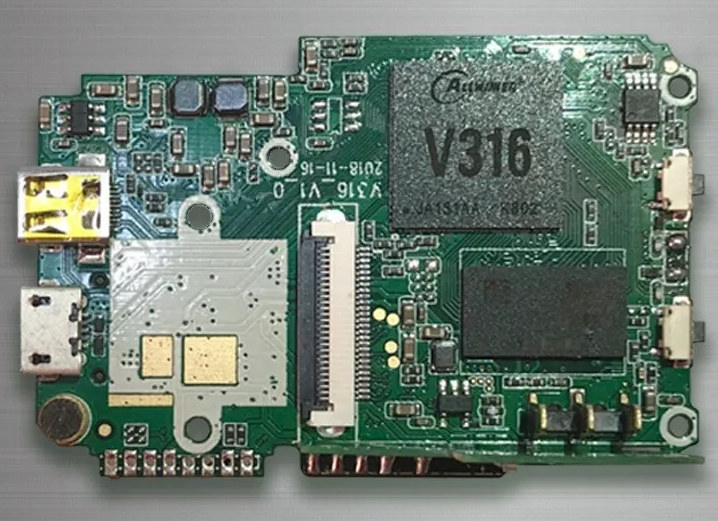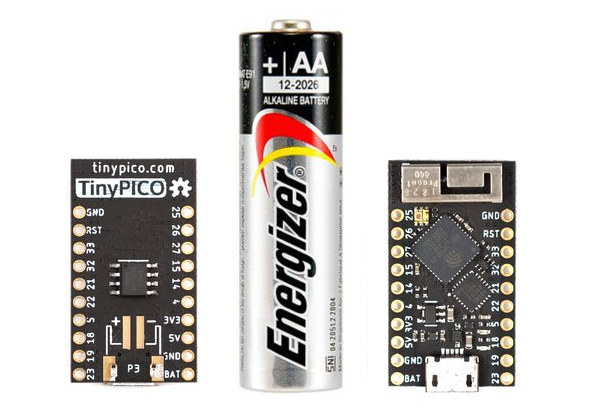Last May, we wrote about RK1808 AI Compute Stick, a USB stick with Rockchip RK1808 dual-core Cortex-A35 processor also featuring a 3.0 TOPS neural processing unit to accelerate AI workloads at low power. As I understood it, it was available for purchase, but you had to contact a Rockchip FAE by email in order to get one. Now, you can easily buy one online by getting the Toybrick TB-RK1808 AI Compute Stick on Seeed Studio for $86. Just ignore the “Core i3” in the title, we’ll see why it’s there further below. TB-RK1808 AI Compute Stick specifications: SoC – Rockchip RK1808 dual-core Cortex-A35 processor with NPU AI inference performance – 3 TOPS for INT8, 300 GOPS for INT16, 100 GOPS for FP16 System Memory – 1GB LPDDR Storage – 8GB eMMC flash Host Interface – USB 3.0 type-A port Power Supply – Via USB port Dimensions – 82 x 31 […]
Pine64 SoEdge-RK1808 AI Module Delivers 3.0 TOPS via Rockchip RK1808 SoC
A few weeks ago, Ameridroid reported Pine64 would soon launch SoRock and SoEdge systems-on-module, but at the time there was virtually no info except SoRock would be likely based on either RK3328 or RK3399 and work on the existing Clusterboard, while SoEdge would be an AI Neural module for Artificial Intelligence tasks, with up to 3 TeraFLOPS of performance. I did not write about it at the time, simply because there was so little information, but this morning I’ve just received some photos of SoEdge-RK1808 module fitted to a baseboard that looks to be SOPINE Model “A” carrier board. SoEdge-RK1808 SoM Let’s try to derive the specifications from the photos even though some components appear to be blurred out or just unclear: SoC – Rockchip RK1808 dual-core Cortex-A35 processor with 3.0 TOPS NPU (Neural Processing Unit) System Memory – 2GB RAM (2x 8GBit Micro DDR4-2400) but limited PC-2133 Storage – […]
Dooba ioNode Microchip AVR Development Board Comes with a C programming SDK
The new Dooba ioNode development board is multifunctional and can be used for projects with space limits. The board features Microchip ATMEGA1284P AVR microcontroller, Dooba’s open-source embedded development ecosystem boasts of a variety of add-on modules which provide the board with increased functionality. These modules will work perfectly with the board and with any project that supports an SPI interface. Some of these add-on modules are: An Aecho MP3 player Nomad LiPo battery Inpad user input module MicroSD socket in SIP or DIP versions The development board is available with either male or female headers. It is also shipped with an IOPROTO prototyping board. You can also choose whether you want the headers already soldered on the top, bottom, or not soldered. The ioNode also features a USB port with USB-UART for programming. Specifications of the Dooba ioNode Core CPU Clock: 10MHz Flash: 128 Kb RAM: 16 Kb I/O 29x […]
Group Theoretic Cryptography (GTC) Offers an Alternative to TLS’s ECC/RSA Security for Microcontrollers
The Transport Layer Security (TLS), sometimes incorrectly referred as its predecessor: Secure Sockets Layer (SSL), helps securing messages over the network using symmetric cryptography, and optionally public-key cryptography (aka asymmetric cryptography). This works well in servers and computers, but with the Internet of Things, even low-power sensor nodes would benefit from secure communication. The trouble is that today’s commonly-implemented RSA- and Diffie-Hellman-type public-key protocols have a memory footprint that will not fit on resource-constrained microcontrollers systems, e.g. Arm Cortex-M0 based ones, and power consumption may also be an issue since many of those are battery-powered. I’m writing about this topic today, as there may be a better alternative for resource-constrained microcontrollers which I noticed in Arm Techcon 2019 schedule, with SecureRF Corporation’s session entitled “When it comes to connect IoT devices, how small is small?” that will present an alternative to TLS’s ECC and RSA based security that relies on […]
96Boards RK1808 & RK3399Pro SoM & Devkit Now Available for Purchase
Back in April, we covered the very first 96Boards SoM’s (Systems-on-Module) which were based on Rockchip RK3399Pro or RK1808 processors, and targeted applications leveraging artificial intelligence acceleration. There were not quite available at the time, but Seeed Studio now has both BeiQi modules for pre-order for $119 and $59 respectively, while the carrier board goes with $125 with antennas, and power supply. Note that the RK3399Pro SoM and the carrier board are basically available now with shipping schedule for July 4th, but you’d had to wait until the end of the month for the RK1808 module. BeiQi RK1808 AIoT 96Boards Compute SoM Module specifications: SoC – Rockchip RK1808 dual-core Arm Cortex-A35 processor @ 1.6 GHz with NPU supporting 8-bit/16-bit operations up to 3.0 TOPS, TensorFlow and Caffe frameworks; 22nm FD-SOI process System Memory – 1GB LPDDR3 (I also read “4GB LPDRR3” (sic.) in other places, but the capacity is likely […]
Obsidian ESP32 Board Follows Raspberry Pi Model A Form Factor (Crowdfunding)
When Thomas McKahan had been playing with ESP32 for a while, he found the need to use Raspberry Pi HAT boards and enclosure with his new hardware, so he went ahead and designed his own ESP32 board compatible with Raspberry Pi accessories, and following the smaller Raspberry Pi Model A / 3 Model A+ form factor. Obsidian ESP32 specifications: Wireless module – Espressif Systems ESP32-WROVER-B 802.11 b/g/n WiFi + Bluetooth 4.2 / BLE module with 16 MB flash, 8 MB PSRAM USB – 1x micro USB port for power and programming Audio – 3.5mm TRS audio jack connected to ESP32 DACs Expansion 40-pin GPIO header compatible with popular HAT expansion boards with 3.3 V signalling, I²S for audio DAC, I²C and SPI, Serial UART available on header or via microUSB, I²C GPIO expander with interrupts & address selection 8-pim unpopulated header from remaining I/Os accessible through GPIO expander 5-pin unpopulated […]
Allwinner V316 Processor is made for Low-Cost “True” 4K 30 FPS Cameras
Allwinner V-Series processors target camera applications, especially sports and action cameras, and we’ve already coverd Allwinner V3 single core Arm Cortex-A7 processor for 1080p60 / 4K15 cameras, as well as Allwinner V5 quad core Cortex-A7 processor for 4K30 cameras enhanced with artificial intelligence capabilities. Allwinner has showcased and/or unveiled more Cortex-A7 processors at CES Asia 2019 such as Allwinner R328 for voice applications, or Allwinner T7 for automotive dashboards, as well as a new camera processor called Allwinner V316 with two Arm Cortex-A7 cores, apparently the same 4K @ 30 fps H.265/H.264 encoder as in V5, but without AI engine architecture. Allwinner V316 key features and preliminary specifications: CPU – Dual core Arm Cortex-A7 processor @ 1.2 GHz ISP – HawkView 6.0 image processor with 2D/3D intelligent noise reduction, frame width dynamic synthesis, sharpening enhancement, specific color enhancement and other image pre-processing techniques Video – 4K Smart H.264/H.265 video encoder […]
Low Power TinyPICO ESP32 Board Ships with Micropython (Crowdfunding)
There are so many ESP32 boards available now, so why bother with another ones. Some of the key selling points of TinyPICO are that it is really small at 32 x 18 mm, it’s easy to use out of the box with MicroPython firmware pre-loaded, and supports LiPo batteries with an optimized power path for low-power battery usage. The developer, named Unexpected Maker, also provides various shields for TinyPICO adding a display, sensors, an audio amplifier, an RTC, Grove headers, and more. TinyPICO board specifications: System-in-Package – Espressif Systems ESP32-PICO-D4 SiP with ESP32 dual-core processor operating at 240 MHz, 4 MB SPI flash External System Memory – 4 MB PSRAM Connectivity – 2.4 GHz WiFi 4 802.11b/g/n, Bluetooth 4.2 LE, 3D antenna Expansion – 14x GPIO broken out to standard pitch headers Debugging / Programming – USB + serial/UART for programming Misc – Power (red) & charge (orange) LED’s, APA102 […]


